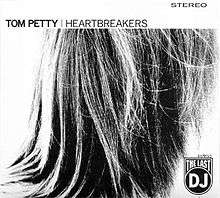The Last DJ
The Last DJ is the 11th studio album by American rock band Tom Petty and the Heartbreakers. The title track, "Money Becomes King," "Joe" and "Can't Stop the Sun" are all sharp attacks on the greediness of the music industry.
| The Last DJ | ||||
|---|---|---|---|---|
 | ||||
| Studio album by | ||||
| Released | October 8, 2002 | |||
| Recorded | 2001–2002 | |||
| Studio | Cello Studios, Hollywood, California | |||
| Genre | Heartland rock | |||
| Length | 47:36 | |||
| Label | Warner Bros. | |||
| Producer | ||||
| Tom Petty and the Heartbreakers chronology | ||||
| ||||
| Tom Petty chronology | ||||
| ||||
| Singles from The Last DJ | ||||
| ||||
| Aggregate scores | |
|---|---|
| Source | Rating |
| Metacritic | 61/100[1] |
| Review scores | |
| Source | Rating |
| AllMusic | |
| Robert Christgau | C+[3] |
| Entertainment Weekly | A–[4] |
| Kludge | 9/10[5] |
| Los Angeles Times | |
| PopMatters | |
| Q | |
| Rolling Stone | |
| Stylus Magazine | D–[9] |
| Uncut | |
A "limited edition" digipack version of the album was also released, including a DVD of music videos and other footage shot during the album's production.
The album reached #9 on the Billboard 200 aided by the single "The Last DJ" which hit #22 on Billboard's Mainstream Rock Tracks in 2002. As of 2010, The Last DJ had sold 353,000 copies in the United States, according to Nielsen SoundScan.[10]
The album marks the return of original Heartbreaker Ron Blair on bass guitar, replacing his own replacement, the ailing Howie Epstein. His return was late in the recording process, however, and Petty and Campbell contribute most of the bass work themselves.
The title track (which was the first single) and "Dreamville" were the only songs from the album included on the compilation The Best of Everything.[11]
Track listing
All songs written by Tom Petty except where noted.
- "The Last DJ" – 3:48
- "Money Becomes King" – 5:10
- "Dreamville" – 3:46
- "Joe" – 3:15
- "When a Kid Goes Bad" – 4:56
- "Like a Diamond" – 4:32
- "Lost Children" – 4:28
- "Blue Sunday" (Petty, Mike Campbell) – 2:56
- "You and Me" – 3:10
- "The Man Who Loves Women" – 2:53
- "Have Love, Will Travel" – 4:05
- "Can't Stop the Sun" (Petty, Campbell) – 4:59
Personnel
Tom Petty and the Heartbreakers
- Tom Petty – guitars, vocals, piano, ukulele, bass guitar on "The Last DJ," "Money Becomes King," "Joe," "Like a Diamond," "Blue Sunday," "You and Me" and "Have Love Will Travel"
- Mike Campbell – guitars, bass guitar on "Dreamville", "When a Kid Goes Bad", and "The Man Who Loves Women"
- Benmont Tench – piano, organ, various keyboards
- Scott Thurston – guitar, lap steel guitar, ukulele, background vocals
- Ron Blair – bass guitar on "Lost Children" and "Can't Stop the Sun"
- Steve Ferrone – drums
Additional musicians
- Jon Brion – orchestration, conductor
- Lindsey Buckingham – background vocals on "The Man Who Loves Women"
- Lenny Castro – percussion
Production
- Mike Campbell – producer
- Richard Dodd – recording engineer
- George Drakoulias – producer
- Ryan Hewitt – assistant engineer
- Steve McGrath – demo engineer
- Tom Petty – producer
- Jim Scott – recording engineer
- Ed Thacker – additional engineer
In popular culture
- In The Simpsons episode "How I Spent My Strummer Vacation" (S14E2), Homer receives instructions in song-writing lessons from Petty. The episode originally aired on November 10, 2002, and featured the track "The Last DJ" playing over the radio in the final scene. The song was later changed for syndication.
- The song "Dreamville" is played at the end of the DVD that was released to commemorate the 2002 Anaheim Angels' World Series win.
References
- "Critic Reviews for The Last DJ". Metacritic. Retrieved 1 January 2013.
- The Last DJ at AllMusic
- Christgau, Robert (April 22, 2003). "Not Hop, Stomp". The Village Voice. New York. Archived from the original on December 20, 2013. Retrieved February 9, 2013.
- Weingarten, Marc (11 October 2002). "The Last DJ Review". Entertainment Weekly. Retrieved 1 January 2013.
- Menocal, Peter. "Tom Petty & The Heartbreakers: The Last DJ". Kludge. Archived from the original on March 4, 2003. Retrieved 1 January 2013.
- Lewis, Randy (6 October 2002). "Jurassic 5's Power Surge". Los Angeles Times. Retrieved 1 January 2013.
- Limmer, Seth M. (1 November 2002). "Tom Petty and The Heartbreakers: The Last DJ". PopMatters. Retrieved 1 January 2013.
- Kot, Greg (17 October 2002). "The Last DJ". Rolling Stone. Retrieved 20 August 2011.
- Hickman, Brett (1 September 2003). "Tom Petty and the Heartbreakers – The Last DJ – Review". Stylus Magazine. Retrieved 1 January 2013.
- McKnight, Connor. "Tom Petty and the Heartbreakers Announce New Album, Tour". billboard.com. February 25, 2010.
- https://www.allmusic.com/album/the-best-of-everything-the-definitive-career-spanning-hits-collection-1976-2016-mw0003214956
- "Tom Petty And The Heartbreakers Chart History". Billboard. Retrieved 2019-04-06.